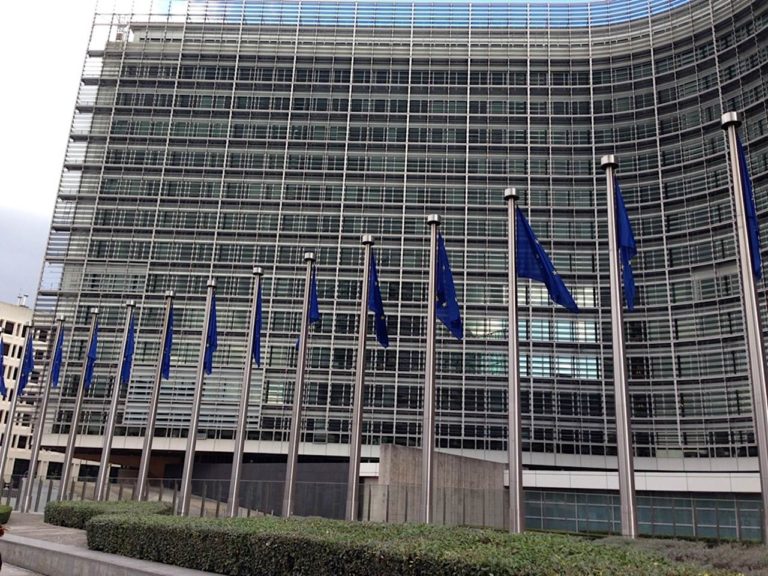Highlights from the Past Week
CW 9 / Monday, 28 February to Thursday, 3 March: Political Group and Committee Meetings Week (Brussels);
EU ISSUES RESTRICTIONS AGAINST RT AND SPUTNIK: After Commission President Von der Leyen announced measures on 28 February, things moved rapidly on Wednesday. The Regulation concerning restrictive measures against RT and Sputnik was published in the Official Journal of the European Union on 2 March, and these restrictions entered immediately into force.
Apart from the deficiency of lead-up time, the Regulation also lacks the necessary quality. Questions of jurisdiction as well as enforceability remained unresolved. In individual countries, lists of the domains to be blocked were distributed. For example, the German Federal Network Agency (BNetzA) sent out the following list on Friday, which is “also currently used in other EU countries.”
- RT – Russia Today English, rt.com
- RT – Russia Today UK, rt.com
- RT – Russia Today Germany, de.rt.com
- RT – Russia Today France, francais.rt.com
- RT – Russia Today Spanish, actualidad.rt.com
- Sputnik, sputniknews.com
However, the BNetzA also pointed out that the list “should not be regarded as conclusive” and that “coordination processes at BEREC level […] are already underway”. A meeting of BEREC alongside representatives of the EU Commission and various associations is planned for today, Monday.
EPRIVACY – NEGOTIATING PROGRESS AFTER NINTH TECHNICAL MEETING: On 2 March, the 9th technical meeting of the trilogue negotiators on the ePrivacy Regulation took place. As has been reported, the atmosphere was “very constructive”.
Of note are the initial discussions on the material scope (which concerns the interaction with the GDPR) and the territorial scope (where the Parliament, unlike the Council, wants to cover any service, even if it is not provided to users in the EU). Regarding the definition of interpersonal communications service, the co-legislators agreed to take a broader approach than in the European Electronic Communications Code (ECC or EECC); namely, not to provide for a de minimis exception for minor ancillary services.
The next round of negotiations at the technical level is scheduled for 17 March, when the negotiators want to finalise the last open issues in Chapters I and III.
GERMAN NETWORK ENFORCEMENT ACT VIOLATES EUROPEAN LAW: According to a decision by the Cologne Administrative Court, the German Network Enforcement Act (NetzDG) on platform regulation violates European law and is therefore partially “inapplicable”. (see Administrative Court Cologne press release – DE).
In expedited proceedings, the court thus ruled for the time being in favour of the plaintiffs Meta and Google. The companies had filed suit inter alia against Section 3a of the German Network Enforcement Act (NetzDG), according to which the networks would have to automatically forward certain potentially illegal content to the German Federal Criminal Police Office (BKA). Google had also filed suit against Section 4a of the German Network Enforcement Act (NetzDG), which designates the Federal Office of Justice (BfJ) as the NetzDG supervisory authority and, in the opinion of the Administrative Court of Cologne, also violates EU law. The decisions in the principal proceedings are still pending.
DIGITAL MARKETS ACT – THIRD POLITICAL TRILOGUE: The third round of negotiations took place on Tuesday last week. EP rapporteur Schwab told Euractiv that the meeting was very good and that he was still convinced that an agreement could be reached by April.
However, the trilogue itself did not produce any major breakthroughs. This intensifies the work ahead of the (potentially last) trilogue on 24 March.
The Commission is under increasing pressure to provide sufficient human resources. Euractiv cites the potential of establishing a joint task force between the Directorate General for Competition (DG COMP) and the Directorate General for Communications Networks, Content and Technology (DG CONNECT) as a possible solution.
Now that the Council has changed its attitude on this, an agreement on interoperability obligations, at least for messaging services, seems to be more likely.
The obligations on default settings, fair treatment, and self-preferencing are on the table for further technical discussions. Regarding targeted advertising, the Commission has advocated for moving the provisions to the Digital Services Act. An agreement seems to be emerging to include the transaction-based model in the definition of active users for online marketplaces. The quantitative thresholds are another contention point, but will not be addressed until after the obligations have been sorted.
DIGITAL SERVICES ACT – EP RAPPORTEUR FOLLOWS COMMISSION ON NOTIFICATION OF CONTENT: In her proposal on Article 14 (PDF) published on 3 March, MEP Christel Schaldemose (S&D) builds on the content notification and removal proposal put forward by the EU Commission. The proposal is to refrain from keeping content available online while it is being assessed by the hosting service provider (Article 14(3a)) and while the assessment of knowledge of illegal content at the end of the assessment is still pending.
The rapporteur also points out that anonymous reports should only give rise to this knowledge when the content concerns the sexual abuse of minors. The anonymity of the private individual reporting the content should also be guaranteed to the person who posted the content online, except in cases involving violations of individual rights or intellectual property. In parallel, the rapporteur has circulated her proposals on marketplaces (Arts. 22 and 24, PDF) and codes of conduct (Art. 35, PDF). (see Contexte, FR, paywall).
COPYRIGHT – ECJ JUDGMENT EXPECTED ON 26 APRIL: The ECJ will deliver its judgment on Article 17 of the DSM Directive on 26 April (see Julie Samnadda on Linkedin). Last July, the Advocate General proposed rejecting Poland’s case against the provisions of Article 17. These provisions oblige platforms to remove a work identified by a rights holder and prevent it from being uploaded again unless a licensing agreement for that content is in place.
CODE OF CONDUCT FOR DATA TRANSFER – DATA PROTECTION BOARD PUBLISHES GUIDELINES: On 22 February, the European Data Protection Board (EDPB) published the final version of its Guidelines on Codes of Conduct as tools for transfers to third countries.
COMMON CHARGING DEVICES – FURTHER AMENDMENTS PUBLISHED: Amendments 60-217 (PDF) to the report of the Parliament’s Internal Market Committee were recently published. In these amendments, the Greens support the efforts of the responsible MEP Saliba (S&D) to extend the scope and go further by including a range of devices operating with “power delivery of up to 100 Watts”, including laptops, mice, satellite navigation devices and electronic toys. The amendments by Renew and EPP MEPs also extend the scope to other devices such as printers, monitors and health measuring devices.
GERMANY – FIRST–TIME BLOCKING OF PORNOGRAPHY OFFERS: The Commission for the Protection of Minors in the Media (KJM) has unanimously decided in the proceedings against the porn portal xHamster that Internet providers must block the offer from being accessed from Germany. On the site, pornographic offers are freely accessible – without ensuring that children and young people do not have access to them. This violates the German Interstate Treaty on the Protection of Minors in the Media (JMStV) and is therefore in violation of the law. Following a previous decision by the Commission for the Protection of Minors in the Media (KJM) in March 2020, the responsible Media Authority of North Rhine-Westphalia had already ordered the provider of xHamster, the company Hammy Media Ltd, to make the site legally compliant and to carry out an age check. (see press release Commission for the Protection of Minors in the Media (KJM) – DE)
FRANCE’S PARENTAL CONTROL LAW: The text obliging device manufacturers to allow parents to control their children’s Internet access was published in the country’s official journal on Thursday. However, the law is not yet in force due to the pending embargo period, as the French government is still waiting for an opinion from the European Commission. According to the text, the law will enter into force three months at the earliest after the Commission’s response.
CONSULTATION ON TOY SAFETY: The Commission last week launched a public consultation for the revision of its Toy Safety Directive. The EU executive body said that one of the issues is feedback on the online sale of harmful toys. The consultation will run until 25 May.
PARLIAMENT’S PEGASUS INQUIRY COMMITTEE CONFIRMED: The Conference of Presidents has agreed to establish a committee of inquiry to investigate the use of the Pegasus spy software within the 27 Member States (see Politico Pro, paywall). The nine-page mandate (PDF), which is to be voted on by the Parliament’s plenary on 8 March, names Hungary and Poland as states where Pegasus has been proven to have been used, but will also investigate other reports.
One of the committee’s aims will be to investigate whether “Pegasus and equivalent surveillance spyware have a negative impact on democratic processes in Member States in elections at local, national and European level”.
MEPs are also likely to look into the Hungarian data protection authority’s authorisation of the use of Pegasus in Hungary. Another stated goal is to investigate Israel’s role in supplying the technology to EU countries and the extent to which the use of the technology involves the transfer of European citizens’ data out of the EU.
Relevant Publications, including from the EP Think Tank:
- Results of the Justice and Home Affairs Council, 3 and 4 March;
- Informal Video Conference of Economy and Finance Ministers, 2 March 2022;
- Strong bicameralism: Pressures for change in inter-institutional legislative negotiations in the EU, the USA, and Germany (In-Depth Analysis)
- The Council: A second chamber for the European Union? (Study)
Outlook for the Coming Week
You can find a list of the upcoming dates of the European Parliament here as well as an overview of the plenary sessions week. The provisional meeting calendar for 2022 can be found here (PDF). The final report of the INGE Special Committee on Disinformation is scheduled for debate on Tuesday and a vote in the plenary is scheduled for Wednesday.
An overview of the most important dates of the Council week can be found here, the meeting calendar is accessible here, and the list of the main topics for the coming 14 days is available here, while an indicative calendar of meetings of the French Presidency Council can be found here (PDF).
Included among these dates are:
Summit and Ministry Meetings:
- Informal Meeting of Development Ministers, Sunday, 6 and Monday, 7 March;
- Informal Meeting of Culture Ministers, Monday, 7 and Tuesday, 8 March;
- Informal Meeting of Telecommunications Ministers, Tuesday, 8 and Wednesday, 9 March;
- Informal Meeting of Heads of State or Government, Thursday, 10 and Friday, 11 March;
Preparatory Bodies:
- Working Party on Competitiveness and Growth (Internal Market), Monday, 7 March and Friday, 11 March;
- Working Party on Competition, Monday, 7 March and Thursday, 10 March;
- Working Party on Cooperation in Criminal Matters (COPEN) (incl. E-Evidence, eCodex), Monday, 7, Wednesday, 9 and Friday, 11 March;
- Horizontal Working Party on Cyber Issues, Tuesday, 8 March;
- Working Party on Tax Questions (Direct Taxation), Tuesday, 8 March and Friday, 11 March;
- Consumer Affairs and Information Working Party (incl. Directive on General Product Safety), Wednesday, 9, Thursday, 10 and Friday, 11 March;
- Working Party on Telecommunications and Information Society, ( AI, Data Act), Thursday, 10 March;
- Working Party on Competitiveness and Growth (Industry), Thursday, 10 March;
- Working Party on Tax Questions (Indirect Taxation), Thursday, 10 March;
- COREPER I, Wednesday, 9 March and Friday, 11 March;
- COREPER II, Monday, 7 March and Wednesday, 9 March;
Information about the weekly Commission meeting can be found in the preview (PDF) or (at short notice) in the current agenda. Topics of particular relevance include the legislative proposal against child abuse (now rescheduled for 30 March), and the Media Freedom Act (29 June).
The following topics are on the agenda for the coming week:
- Joint European Action for more affordable, secure and sustainable energy
- Proposal to prevent and combat specific forms of gender-based violence
You can find the judicial calendar of the ECJ here. According to initial reports, the ruling in Poland’s case on Art. 17 of the DSM Directive is scheduled for 26 April (C-401/19).
European Parliament Committees
CW 10 / Monday, 7 to Thursday, 10 March: Plenary Sessions Week (Strasbourg);
LIBE Committee (EP)
Current Meetings
- None
Further Meetings (Calendar)
- Wednesday, 16 March 2022, 9.00-12.00 and 13.45-15.45 (Brussels)
- Thursday, 17 March 2022, 9.00-12.00 and 13.45-15.45 (Brussels)
JURI Committee (EP)
Current Meetings
- None
Further Meetings
- Monday, 14 March 2022 (Brussels)
- Tuesday, 15 March 2022 (Brussels)
- Wednesday, 16 March 2022 (with FEMM, Brussels)
Dossiers Timetable (17 February 2022)
ITRE Committee (EP)
Current Meetings
- None
Further Meetings (Calendar)
- Monday, 14 March 2022, 14.45-16.15 (with CONT, ITRE, REGI; Brussels)
- Tuesday, 15 March 2022, 9.00-12.00 (Brussels)
Dossiers Timetable (1 March 2022)
IMCO Ausschuss (EP)
Current Meetings
- None
Further Meetings (Calendar)
- Wednesday, 16 March 2022, 45-15.15 (Brussels)
- Thursday, 17 March 2022, 30-12.30 (Brussels)
- Monday, 28 March 2022, 13.45-16.15 and 16.45-18.45 (Brussels)
Dossiers Timetable (March 2022)
CULT Committee (EP)
Current Meetings
- None
Further Meetings (Calendar)
- Monday, 14 March 2022, 13.45-15.45 and 16.45-18.45 (Brussels)
- Tuesday, 15 March 2022, 13.45-15.45 and 16.45-18.45 (Brussels)
AIDA Committee (EP) – Special Committee on Artificial Intelligence in the Digital Age
Current Meetings
- None
Further Meetings (Calendar)
- Tuesday, 22 March 2022, 9.00-12.00 (Brussels)
INGE (EP) – Special Committee on Foreign Interference in all Democratic Processes in the European Union, including Disinformation
Current Meetings
- None
Further Meetings (Calendar)
- Monday, 14 March 2022, 16.45-18.45 (Brussels)
- Monday, 28 March 2022, 16.45-18.45 (Brussels)
Further Scheduled Parliamentary Calendar Dates
- CW 11 / Monday, 14 to Thursday, 17 March: Committee Meetings Week (Brussels);
- CW 12 / Monday, 21 to Thursday, 24 March: Mini Plenary Sessions Week (Brussels);
- CW 13 / Monday, 28 to Thursday, 31 March: Political Group and Committee Meetings Week (Brussels);




